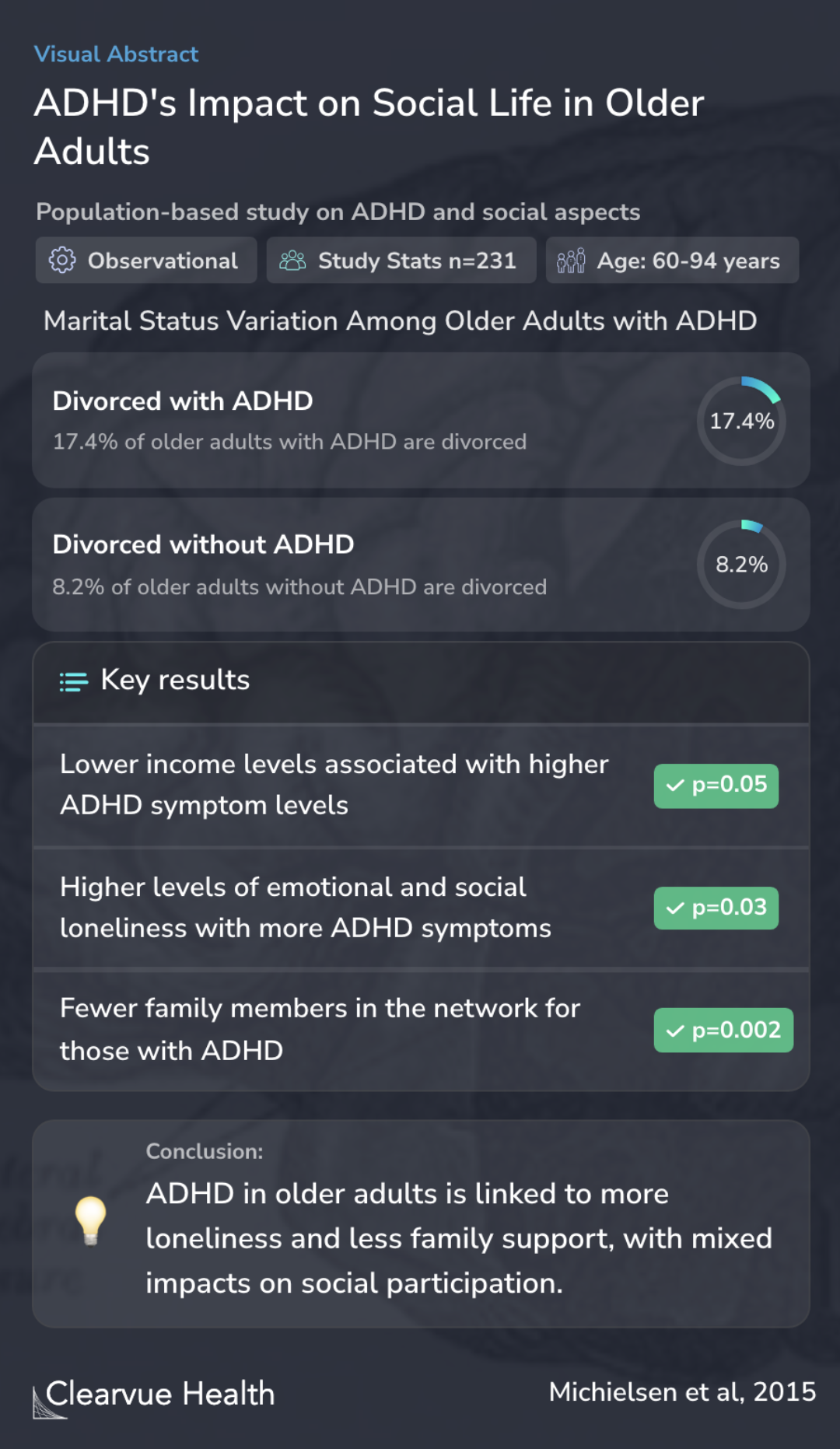The relationships between ADHD and social functioning and participation in older adults in a population-based study
ADHD's Impact on Social Life in Older Adults
Michielsen M, Comijs HC, Aartsen MJ, Semeijn EJ, Beekman AT, Deeg DJ, Kooij JJ

Objectives
The study aimed to explore how ADHD affects older adults, especially in terms of their social lives and involvement in community activities.
To examine the associations between ADHD and social functioning and participation among older adults.
Methods
In the exploration of ADHD's impact on older adults, data was gleaned from the Longitudinal Aging Study Amsterdam (LASA). During 2008 and 2009, a group of individuals, ranging in age from 60 to 94 years, were inquired about their social engagement and interpersonal interactions. A subset of this group underwent a detailed interview to identify the presence of ADHD. This examination was not just about confirming ADHD but also measuring the intensity of ADHD-related symptoms.
Data were used from the Longitudinal Aging Study Amsterdam (LASA). In 2008/2009, respondents were asked about social functioning and participation. A diagnostic interview to diagnose ADHD was administered among a subsample (N = 231, age 60-94 years). ADHD diagnosis and level of ADHD symp...
Results
One significant finding was that individuals with ADHD tended to have smaller family networks. This was not just a random observation but was supported by statistical evidence indicating a strong correlation. Furthermore, the study shed light on the emotional landscape of those with ADHD, revealing higher levels of loneliness, both emotional and social, which correlates with the intensity of ADHD symptoms. In terms of financial well-being, a link was observed between the severity of ADHD symptoms and lower income levels, suggesting an economic dimension to the challenges faced by older adults with ADHD.
An interesting aspect of the study focused on marital status, revealing that older adults with ADHD were less likely to be married or widowed but more likely to be divorced or never married. This finding points to the potential impact of ADHD on long-term personal relationships among older adults.
ADHD diagnosis was associated with being divorced/never married, having less family members in their network, and emotional loneliness. Level of ADHD symptoms was associated with more emotional support given, emotional and social loneliness, greater recreational social participation, and...
Conclusions
ADHD in the later stages of life emerges as a factor linked to a spectrum of social and emotional challenges. The findings from the study indicate that older adults with ADHD may experience a greater sense of loneliness and have fewer family members to rely on. While these outcomes highlight the personal toll of ADHD, they also suggest a mixed effect on social participation. This dual nature of ADHD's impact underscores the complexity of its influence on the lives of older adults. The broader implications of these findings are visually synthesized to underscore the multifaceted relationship between ADHD and social well-being in older adulthood.
ADHD in old age is related to being divorced/never married and loneliness but not to work participation. Psycho geriatric practices should direct their attention to loneliness when treating ADHD.
Key Takeaways
Context
.In the wider context of existing research, the study's conclusions resonate with other findings that underscore the pervasive impact of ADHD across various aspects of adult life, including career, education, and personal relationships. The prevalence and correlates of adult ADHD in the United States, as investigated by Kessler et al., along with Barkley et al.'s examination of the link between executive function and job performance, provide a broader backdrop against which the current study's findings can be understood.
These additional studies reinforce the notion that ADHD's effects extend beyond childhood, influencing the full spectrum of adult life and underscoring the importance of addressing ADHD's implications across all age groups.